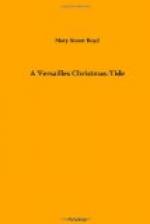It was in a patisserie in the Rue de la Paroisse that we noticed an uninviting compound labelled “Pudding Anglais, 2 fr. 1/2 kilo.” A little thought led us to recognise in this amalgamation a travesty of our old friend plum-pudding; but so revolting was its dark, bilious-looking exterior that we felt its claim to be accounted a compatriot almost insulting. And it was with secret gratification that towards the close of January we saw the same stolid, unhappy blocks awaiting purchasers.
[Illustration: The Mill]
The presence of the customary Tuesday market kept the streets busy till noon. But when the square was again empty of sellers and buyers Versailles relapsed into quietude. I wonder if any other town of its size is as silent as Versailles. There is little horse-traffic. Save for the weird, dirge-like drone of the electric cars, which seems in perfect consonance with the tone of sadness pervading the old town whose glory has departed, the clang of the wooden shoes on the rough pavement, and the infrequent beat of hoofs as a detachment of cavalry moves by, unnatural stillness seems to prevail.
Of street music there was none, though once an old couple wailing a plaintive duet passed under our windows. Britain is not esteemed a melodious nation, yet the unclassical piano is ever with us, and even in the smallest provincial towns one is rarely out of hearing of the insistent note of some itinerant musician. And no matter how far one penetrates into the recesses of the country, he is always within reach of some bucolic rendering of the popular music-hall ditty of the year before last. But never during our stay in Versailles, a stay that included what is supposedly the gay time of the year, did we hear the sound of an instrument, or—with the one exception of the old couple, whom it would be rank flattery to term vocalists—the note of a voice raised in song.




